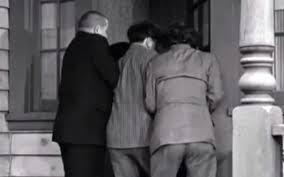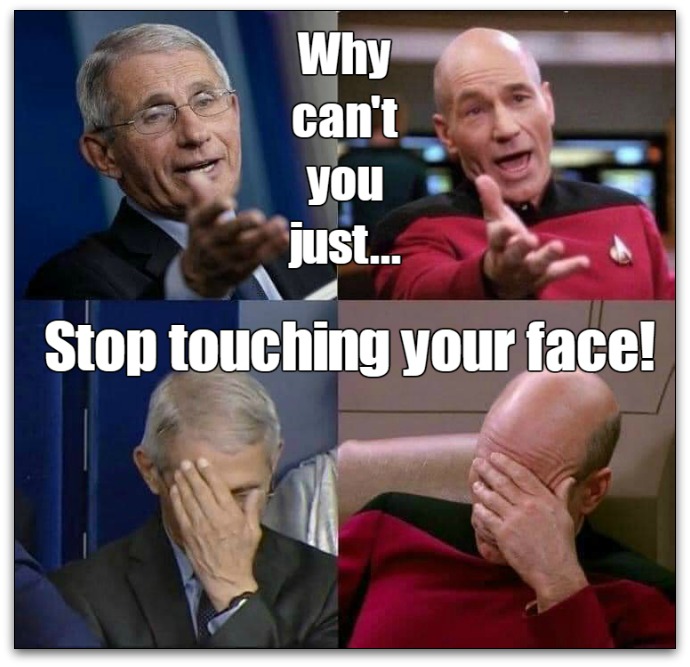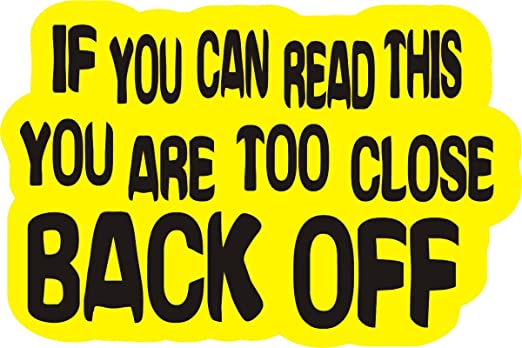Experts will tell you that a mask doesn’t protect the person who wears it from coronavirus and COVID-19. But the experts are wrong. Here are three reasons why.
If you’ve been paying any attention around you over the past few months, you will have heard the experts switch their advice on wearing masks several times. Maybe wear masks. Don’t wear masks. Wear masks.
The one message that has been (relatively) consistent is that wearing a mask will protect people around you, but not you.
That statement is half right. And half wrong.
Before I get to the three reasons the advice is wrong, let’s look first at how the advice is right
Masks do protect you from infecting people around you
A mask does indeed protect you from infecting people around you with coronavirus and COVID-19. Let’s look at how it does this and why you really should care enough to wear one.
When you cough or sneeze, and even when you just talk, you emit thousands of tiny droplets. Just one minute of talking could spew out as many as 100,000 droplets, lingering in the air for ten, 20 or even more minutes. If you have the coronavirus in your system, even if you don’t know it, the virus is in those droplets.
Health experts have rightly identified wearing a mask as protection against spitting or sneezing out these contaminated droplets onto:
- other people’s faces
- other people’s hands and arms
- other people’s clothes
- counter tops that other people might touch
- the air that other people will breathe
By wearing a mask, you do indeed protect people around you.
But why should you protect them, you might ask? Here are two good reasons.
Protect other people because it’s neighborly
Imagine that you are driving at dusk. You know there might be pedestrians around, but probably not. You can still see without your headlights, but if you turn them on you’ll be better able to see pedestrians, even those foolishly wearing grayish clothing.
What do you do?
Of course you will turn on your lights to reduce the risk of accidentally murdering a fellow citizen. You’ll do what you feel you safely can to avoid killing raccoons or foxes, too.
Bottom line: you don’t want to kill somebody, even by accident.
So, if wearing a mask can help you avoid accidentally killing somebody, can there any better reason to wear one?
Protect other people to protect yourself
Ah, but there are other reasons, including a very selfish reason to protect people around you.
If you accidentally infect someone around you, they might in turn accidentally infect people around them. As long as we keep passing this virus around, it can end up with anybody. I’m sorry if this is too graphic, but it could end up killing a friend of yours or even a member of your family.
Or you.
You might have heard of immunity. Once you get the virus, you might supposedly be immune. “Might.” “Supposedly.” The fact is that we just don’t know. And other coronaviruses, typically known as colds and flues, come back year after year. If immunity exists, we have no idea how long it lasts.
And if immunity exists, we don’t know if it applies to somebody who is asymptomatic. You might be carrying the virus (novel coronavirus) without being sick (having the disease called COVID-19), and therefor not actually building up immunity.
The bottom line is that if you have this virus in your system and you infect somebody, you have no idea if you will kill somebody, who you might kill or how many people you could kill.
So, wear a mask to protect yourself from infecting and possibly killing people around you (including yourself).
Masks also protect you from other people around you
This is where the experts get it wrong. In fact, they aren’t even thinking through some of the most important parts. While they talk about only one way masks protect you, there are in fact three ways masks protect you from getting infected by people around you.
Masks protect you from airborne infection
This is what the experts talk about and disagree about. Many of them say that masks don’t protect you from airborne droplets.
Let’s look at the facts.
Masks have holes in them. They are porous. That’s how you can breathe through them. Unfortunately, droplets can also go through those tiny holes along with the air.
Regular medical masks and cloth masks have bigger holes that let in more droplets than those fancy N95 masks that healthcare workers wear. With those bigger holes, are they useless? Studies are mixed.
- First, the mask will stop the bigger droplets.
- Second, it will stop even some smaller droplets that hit the fabric.
- Third, it will stop two or three droplets trying to pass through a hole at once (picture the Three Stooges all trying to pass through a window at once).
If a mask stops some, but not all, of the droplets, does it matter? Most likely, yes. The best guess is that you are less likely to get sick if you are exposed to fewer microbes, but we don’t know for sure and we don’t know by how much.
As retired public health specialist and epidemiologist Dr. Felix Li puts it:
While there is abundance of scientific evidence that surgical masks can protect health care workers from droplet-transmitted diseases, including COVID-19, some health authorities still maintain that somehow the same mask cannot perform the same function for the general public?
Are they all not human beings, with the same general anatomy and physiology? Let’s be frank: Masks can protect all people against droplet-transmitted diseases such as COVID-19. The only difference here is that the general public has a relatively lower risk of exposure to the virus than health care workers.
If you go into a crowded place, such as a bus or an elevator, your risk of exposure gets much higher.
Masks protect you from touching your face
But here’s another reason to wear a mask that nobody is talking about – and the silence from health experts on this is really puzzling. It’s how masks protect you from getting infected by yourself.
A mask keeps you from touching your face.
Did you know that you probably touch your face 15.7 times per hour. Or 23 times per hour. And it’s next impossible to not touch our faces.
Do you know what else you touch in between face touches?
- counter tops
- door knobs
- gas pumps
- elevator buttons
- hand rails
- products on store shelves
When an infected person coughs, sneezes or even just talks, guess where their droplets land?
- on counter tops
- on door knobs
- on gas pumps
- on elevator buttons
- on hand rails
- on products on store shelves
They also touch their face 16 or 23 or however many times per hour, and then they also touch…
- counter tops
- door knobs
- gas pumps
- elevator buttons
- hand rails
- products on store shelves
Almost everything in a public place could be infected, and you will touch many of those things. Yes, even shopping carts and bus poles and seats and turn styles and pens and paper and so many other things that others might have touch before you or breathed on.
Wearing a mask protects you from putting your potentially contaminated finger or hand near your nose or mouth. You might still touch your face, possibly even your eyes, but your have hugely reduced your risk of infection by keeping your nose and mouth covered.
In fact, a mask might be as effective at protecting you in public places as hand sanitizer. Perhaps even more effective.
Masks protect you from people getting too close
There is a third reason to wear a mask. It acts a lot like those bumper stickers:
“If you can read this bumper sticker, you are following too closely.”
A mask serves as a reminder to people to keep their distance. Or at least it lets people know that you are sensitive to them invading your space. In other words, masks help encourage distancing.
Some people will invade your space anyway. But those people probably don’t turn on their headlights, either. Thankfully, few people are like that (and most of them are too busy trolling on social media to approach you in real life, anyway).
Just wear a mask
So, just wear a mask whenever you’ll be indoors near people.
You don’t need one at home.
You don’t need one in open spaces outdoors.
And they do not replace physical distancing or hand-washing. These remain critical ways of protecting yourself against coronavirus and COVID-19.
But when you’ll be in an enclosed space where other people are (or have recently been), or where you might touch objects that other have touched or been near while breathing, wear that mask!






The bottom line with wearing a mask is that if everyone is doing it, it will prevent mass spread of coronavirus. I appreciate this article very much. I am so tired of ignorant people refusing to wear a mask. It is not hard to put a mask on and it really does help prevent that spread of the virus. This is something I am passionate about making sure those around me understand. Thank you so much for posting this and I appreciate that you are willing to voice your oppinion on masks so well. Glare at all those who refuse to wear a mask, make them uncomfortable.
In countries where mask wearing had already been accepted, the Covid-19 results quickly got under control. If we could all just suck it up and wear our masks, we could get back to normal much quicker!